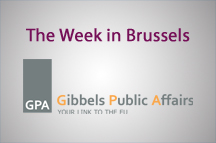Empty pockets

Brussels this week was of course dominated by the debate, or non-debate, on Greece. Will Greece be willing and able to pay its next round of debts or will a Greek default loom much quicker than expected? In the weeks running up to yesterday’s (Thursday) meeting of the finance ministers, both Greek finance minister Varoufakis and the country’s Prime Minister Tsipras presented themselves more and more defiant towards their creditors as Tsipras called their proposals unacceptable whilst accusing them of strangling his country.
One might argue, therefore, that yesterday’s non-resolution does not quite come as a surprise. Tsipras claims a clear mandate from his people, who are fed up with austerity. Equally fed up, however, is the IMF’s chief Christine Lagarde, who made it very clear that there will be no period of grace, should Greece fail to meet its 1.6 billion Euro repayment on 30 June, technically putting it in immediate default. Plans of further Eurozone integration, which will be laid out in a ‘five presidents’ report’, are delayed by prospects of a Grexit, whilst Tsipras flies to Russia for chats with Putin in the margins of Russia’s prime business conference.
 €2.5 coins
€2.5 coins
Whilst Greece is hemorrhaging coins, Belgium is minting new ones, in an act of defiance against France. In commemoration of what many Belgians believe to be the most important battle in recent history - the battle of Waterloo - Belgium had already minted 180.000 commemorative coins, celebrating the victory over Napoleon. Shortly thereafter, a letter from Paris was sent, outlining the sensitivities, which was followed by a French veto, forbidding Belgium to create and use the coins. Belgium wasn’t about to take this from France and found a loophole in a law that allows European countries to mint any coin it wishes, as long as it is an irregular denomination. Though the French remain ambivalent regarding Napoleonic history, to the Belgians yesterday’s bicentennial was to be one of reconciliation and unity.
Beware of the butcher
Big news as well within the European Institutions this week as the Council finally came out of a deadlock to forge a general approach on the General Data Protection Regulation (GDPR). The issue is of direct importance to an incredibly large number of stakeholders as nearly every European is emotionally involved in the debate, which discusses their online and data privacy. An important challenge will be to create a regulation, which initially aims to protect citizens from online giants (whether search or social), that does not strangle Europe’s many SMEs in the process. Whilst it is important to ensure that companies, even small ones, that process sensitive data do so in a responsible manner, it would make no sense to make a butcher hire an expensive data protection officer, simply because he manages a large mailing list so that he can inform his clients that his steaks will be on sale next week.
Let’s hope that common sense will prevail so that Greece and its creditors will come to a solution, our data will be safe without crippling our economy, and France and Belgium remain friends.














